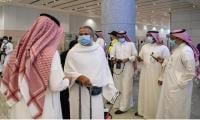Sindh Governor Imran Ismail on Thursday said violence against women was a serious problem and it should be our aim to reach out to the victims of violence.
He was addressing an event to inaugurate a 10-day media fellowship for journalists on how to report on women issues with a special focus on gender-based violence (GBV) and child marriages. At least 35 media persons are attending the workshop being organised by the National Commission on the Status of Women (NCSW) in collaboration with the United Nations Population Fund (UNFPA) and the Centre for Excellence in Journalism (CEJ), Institute of Business Administration, Karachi.
The workshop was launched to mark International Day for the Elimination of Violence Against Women that falls on November 25. Ismail told the audience, comprising journalists, members of the NCSW, women rights activists and students of media, that it was the priority of government to focus on helping women get justice.
He said the government would, with the help of the NCSW, clear all outstanding dues of women languishing in jails so that they could be set free as soon as possible. “The government has to recognise the problems and challenges being faced by women prisoners in Sindh and take action to help them.”
Welcoming the governor, NCSW Chairperson Nilofar Bakhtiar explained to the audience the importance of launching a media fellowship to train journalists on how to report on incidents of violence against women.
Talking about the 16 days of activism against gender-based violence, Bakhtiar said that it was important to remember how women continued to be victims of violence in Pakistan and the world over.
“This day is dedicated to the unnamed acid attack survivors, the bruised women with broken teeth, and young girls outside who don't know we are here today for this cause,” she said.
NCSW Secretary Arif Anwar Baloch said media persons from across the country had been selected for the National Media Fellowship. “We made sure we selected some of the best journalists in the country who write on this topic,” he added.
UNFPA Resident Representative Dr Bakhtior Kadirov said, “We encourage journalists to create public awareness on GBV and child marriage issues that are crucial for development.” He added that the media could play a vital role to end the GBV.
Nuzhat Shirin, the Sindh Commission on Status of Women chairperson, said that everyone at the federal and provincial level would have to unite if we wanted to end violence against women.
CEJ Acting Director Ayesha Azhar Shah said the CEJ believed that the media had a key responsibility to ensure women had a voice. “Our media is not trained in how to report on violence against women. Through this fellowship, we aim to train journalists,” she said. Artwork made by women prisoners in Karachi jails were also exhibited at the event.
HBWWF’s meeting
Women workers should be given equal wages for same work, and the gender-based disparity in wages should be ended, said speakers at a consultative meeting of women workers held at the Arts Council of Pakistan on the occasion of International Day for the Elimination of Violence Against Women.
The Home-based Women Workers Federation (HBWWF) hosted the meeting that demanded an end to harassment of women at workplaces. The speakers at the event also demanded that anti-harassment committees be established at every workplace so that gender-based violence against women workers could be done away with.
HBWWF’s Zahra Khan, Saira Feroze of the United HB Garment Workers Union, Nasir Mansoor of the National Trade Union Federation, Dr Shershah Syed of Pakistan Medical Association, Shaher Bano of Karachi Union of Journalists, SCSW’s Nuzhat Shirin, Aurat Foundation’s Mahnaz Rehman, Karamat Ali of the National Labour Council, and Saeed Baloch of the Pakistan Fisherfolk Forum were prominent among the meeting’s participants.
The event was told that international day was observed in memory of three revolutionary sisters are remembered in the history as Mirabal Sisters. As a result of their struggle and sacrifice, the Dominican Republic got freedom from dictatorship. In 1999, the general assembly of the United Nations announced observing November 25 as International Day for the Elimination of Violence Against Women. The speakers lamented that people did not know about the importance of the day.
The consultative meeting observed that the rights of working women were in fact human rights and without understanding them, gender equality could not be achieved. The prevailing economic crisis and negative social attitudes were worsening the conditions for working women, while women working in the informal sector were compelled to work on very low wages, it was said.
The meeting demanded an end to all the discriminatory laws against women and harassment of women at workplaces.It was also demanded that women workers be paid wages equal to male workers for the same work and baby care centres be established in factories and workplaces.
KU event
A conference, titled ‘Understanding violence against women in Pakistan – Causes and Trends’, was held at the Arts and Social Sciences Auditorium of the University of Karachi (KU) to mark the international day.
Speakers at the event said women faced violence because of an imbalance of power in society and a massive rate of domestic violence against women and children was observed during the recent lockdowns imposed due to the Covid-19 pandemic in the country.
The conference was organised by the KU Centre of Excellence for Women’s Studies in Collaboration with the UN Women. KU Acting Vice Chancellor Dr Khalid Mahmood Iraqi said that women were unfortunately not treated like men in our society. He stressed the need for addressing the root causes of violence against women, and called for reporting cases for implementing the laws in its true spirit.
UN Women Deputy Country Representative Jacqui Ketunuti through a video link shared that the trend of sexual harassment against women had reached alarming levels and it needed to be addressed in a timely manner.
The policymakers must work together to find effective solutions to the problem of violence against women, she said, adding that the civil society, private sector and community representatives could prove productive for ending violence against women.
Pakistan Institute of International Affairs Chairperson Dr Masuma Hasan, who delivered the keynote address, spoke on reasons for violence against women in Pakistan and various types of violence.
She was of the view that femicide was common around the globe and India was being called the rape capital of the world. Each year, around 1,000 women in Pakistan were killed in the name of honour, the speaker lamented. She said girls continued to be abused in the country and their bodies were found in garbage dumps.
She also mentioned the increasing incident of cybercrimes against women in Pakistan, which had added to the deteriorating socio-economic condition of women in the country.
Dr Masooma said the Hudood Ordinance was an obstacle for women as women were convicted of adultery when they were unable to prove the rape. KU Arts and Social Sciences Dean Prof Dr Nusrat Idrees said that women faced violence inside and outside the house, and a majority of cases were not reported.
She mentioned lack of social, economic, and political support as the cause of violence. Referring to the World Economic Forum report, she mentioned that Pakistan stood at 153 out of 156 countries in the Global Gender Gap 2021.
Prof Dr Anila Amber Malik of the KU psychology department said violence against women was on the rise in modern societies and its effects on the mental and physical health of women were increasing. “Only by providing rights and empowerment to women on the basis of equality can the formation of a healthy society be ensured,” she added.
Presenting her research paper, Prof Zainab F Zadeh from the United Kingdom said that according to the World Health Organisation, 736 to 852 million, or one in three women aged 15 years and above, had experienced violence at least once in their lives.
She shared that the Pakistan Demographic and Health Survey report showed that 34 per cent of ever-married women had experienced spousal physical, sexual, or emotional violence, and seven percent of women who had ever been pregnant had experienced violence during pregnancy.
The picture shows a pharmacy. — AFP/FileThe Karachi administration has launched a campaign to check the expiry dates...
In this still, Karachi Mayor Barrister Murtaza Wahab addresses an event on April 25, 2024. — Facebook/Barrister...
In this still, Sindh Inspector General of Police Ghulam Nabi Memon chairs a meeting at the Central Police Office on...
Representational image shows police tape. — AFP/FileAn elderly man who ran a general store was shot and killed in...
A handcuffed suspect stands behind the bars with a policeman standing outside the jail in this undated image. —...
In this still, Sindh Chief Minister Syed Murad Ali Shah meets federal energy minister Owais Ahmad Khan Laghari in...







